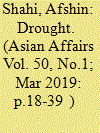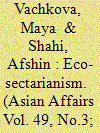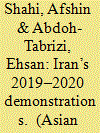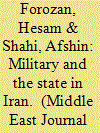| Srl | Item |
| 1 |
ID:
165216


|
|
|
|
|
| Summary/Abstract |
Approximately 97% of the country is experiencing drought conditions. Due to gross water mismanagement and its damaging impact on the country, Iran faces the worst situation in water resources of any industrialized nation. Tens of thousands of villages have been deserted and most of the major urban centers have passed their limits to absorb new rural migrants. Some officials predict that in less than 25 years, 50 million Iranians would be displaced from their current homes because of the pressing ecological conditions. This is happening at the time that the gap between the grassroots and the state has widened and there is increasing dissatisfaction with governance plagued by corruption, nepotism, economic mismanagement, unaccountability and a foreign policy which has produced various regional and trans-regional adversaries. This paper evaluates the pressing ecological challenges in Iran and by conceptualizing political resilience it critically evaluates whether the Islamic Republic is prepared to face the devastating ecological crisis and its socio-economic consequences.
|
|
|
|
|
|
|
|
|
|
|
|
|
|
|
|
| 2 |
ID:
160675


|
|
|
|
|
| Summary/Abstract |
This study introduces ‘eco-sectarianism’, which is a new concept that explains the relationship between sectarian violence and environmental pressures in divided societies in the Middle East. Against the backdrop of climate change, ‘eco-sectarianism’ poses a challenge to many fragmented and unequal societies where the sense of national consciousness is weak and nation-building projects are incomplete. This paper draws attention to the links between politicisation of sub-national identities and emerging ecological challenges in Syria.
|
|
|
|
|
|
|
|
|
|
|
|
|
|
|
|
| 3 |
ID:
171870


|
|
|
|
|
| Summary/Abstract |
The widespread protests of November 2019 may be marked as the bloodiest recent chapter of the Islamic Republic of Iran's history in terms of popular dissent. The two major protests in December 2017 and November 2019, followed by the public reaction to the shooting down of the Ukrainian International Airlines Flight 752 by the IRGC over Tehran after the US killing of General Soleimani, suggest that the prevailing dynamics of political protest in Iran are changing. There is an increasing sense of radicalisation among protesters, while the state is prepared to resort to extreme violence to maintain control. The geography of political protest has changed. The declining economic situation has had a profound impact on the more vulnerable segments of the society who are now increasingly playing a more proactive role in challenging the state. The methods of protest have been evolving over the last four decades, especially in the cultural arena. Last but not least, the willingness of the protesters both to endure and inflict violence is precipitously transforming state-society relations beyond recognition.
|
|
|
|
|
|
|
|
|
|
|
|
|
|
|
|
| 4 |
ID:
150960


|
|
|
|
|
| Summary/Abstract |
The Islamic Revolutionary Guard Corps (IRGC) is a multilayered political, ideological, and security institution that has steadily acquired an increasing role in Iran's economy in recent years. This article analyzes the growing economic and business involvement of the IRGC in the broader context of Iranian statesociety relations in general, and its civil-military dynamics in particular. More specifically, we look at the political and socioeconomic processes within which the IRGC operates at the interrelated levels of the state and society. This analysis sets out the framework based on which we examine the IRGC's increasing power in the course of its engagements and various conflicts in both political and societal arenas, in particular its economic expansion under Mahmud Ahmadinejad's presidency. This article concludes by discussing the implications of the IRGC's rise on the economic policy of the government under President Hassan Rouhani.
|
|
|
|
|
|
|
|
|
|
|
|
|
|
|
|
| 5 |
ID:
169229


|
|
|
|
|
| Summary/Abstract |
This paper develops the notion of ‘Talibanization’ – a concept which stems from the resilience and the determination of the Taliban to remain a dominant player in Afghanistan even after the downfall of their state in 2001. The factors that helped the Taliban to maintain their influence after the disintegration of their state constitute a pattern which could be applied to other conflict-driven areas such as Syria. By critically examining the socio-political conditions in the Syrian district of Jarablus, this paper demonstrates the ways in which the inept post-IS administration is inadvertently helping IS to gain what we call ‘retrospective legitimacy’ a drive which could sustain its influence for many years following its downfall.
|
|
|
|
|
|
|
|
|
|
|
|
|
|
|
|